Mr. Wilkie Collins brings to his work, along with other and valuable qualities, the special talent of the private detective and the criminal lawyer. Almost no modern novelist stands in any comparison with him for skill in constructing the engrenage, as a Frenchman would call it, of personal complication, for subtle delicacy in fitting together wheel and spring, pivot and pinion of his dramatic clockwork, in such fascinating interplay as shall lead the attention of the breathless spectator smoothly, imperceptibly, but inevitably to the final wind-up of the catastrophe. This skill in combining events is supplemented by, or rather cognate with, his shrewd analysis of character and motive. It is his favorite plan to suppose a case of private relation where virtuous personages or important interests are threatened by the schemes of some clever villain. Against him Mr. Collins, in the person of his beneficent and equally clever hero or heroine, straight sets his wits to defend the interests or persons attacked. The resulting struggle is carried on with the most exquisite skill of fence, involving both practical device and metaphysical penetration and shrewdness, till the final triumph of the right and confusion of the wrong-doers. In this book the metaphysical element assumes unusual importance. The book is in so far an exception to the usual run of Mr. Collins's works, that it is less a leaf from the records of Scotland Yard than an extract from the diary of a psychologist. There is a villain and a protecting genius, as usual ; but the villain is only a half one after all, and we are less interested in the actual facts of his rascality than in the causes which lead him to it, and the temperament which renders it possible. In the leading character, poor Miss Finch herself, the author develops an interesting question of medical psychology. A young girl, blind almost from her birth, loves one of two twin brothers, who has, in the process of medical treatment for epilepsy, been terribly disfigured in complexion by the use of nitrate of silver. From Lucilla's instinctive horror of dark objects, the injudicious and timid concealment by the lover of his dusky hue, and the treacherous advantage taken of these things by the other twin, Nugent, to supplant his brother — the whole complicated by Lucilla's temporary restoration to sight and subsequent relapse — arises the whole intrigue of the story …

The Haunted Hotel :
Wilkie Collins
audiobook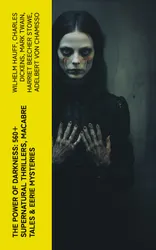
The Power of Darkness: 560+ Supernatural Thrillers, Macabre Tales & Eerie Mysteries : The Legend of Sleepy Hollow, Sweeney Todd, Frankenstein, Dracula, The Haunted House, Dead Souls…
Wilhelm Hauff, Charles Dickens, Mark Twain, Harriet Beecher Stowe, Adelbert von Chamisso, Oscar Wilde, Robert Louis Stevenson, Edgar Allan Poe, William Hope Hodgson, Joseph Sheridan Le Fanu, John Buchan, Louis Tracy, Bram Stoker, Anatole France, Charlotte Brontë, Emily Brontë, Jack London, Henry James, Théophile Gautier, Arthur Conan Doyle, Richard Le Gallienne, Jane Austen, Ralph Adams Cram, Thomas De Quincey, John Meade Falkner, Guy de Maupassant, Thomas Hardy, William Archer, Daniel Defoe, John Kendrick Bangs, Cleveland Moffett, Brander Matthews, Marie Belloc Lowndes, Horace Walpole, Rudyard Kipling, Lafcadio Hearn, Hugh Walpole, Ambrose Bierce, Frederick Marryat, Ellis Parker Butler, Washington Irving, Leonid Andreyev, David Lindsay, Nathaniel Hawthorne, Grant Allen, Arthur Machen, Wilkie Collins, William Makepeace Thackeray, Thomas Peckett Prest, James Malcolm Rymer, Fergus Hume, Edward Bellamy, Walter Hubbell, Charlotte Perkins Gilman, Leopold Kompert, Richard Marsh, Florence Marryat, Catherine Crowe, John William Polidori, Vincent O'Sullivan, H. G. Wells, Robert W. Chambers, W. W. Jacobs, M. P. Shiel, E. F. Benson, Jerome K. Jerome, M. R. James, E. T. A. Hoffmann, Stanley G. Weinbaum, George W. M. Reynolds, H. P. Lovecraft, Robert E. Howard, Edith Nesbit, Sabine Baring-Gould, William Thomas Beckford, Francis Marion Crawford, Lucy Maud Montgomery, Mary Elizabeth Braddon, Mary Louisa Molesworth, Mary E. Wilkins Freeman, Nikolai Gogol, Mary Shelley, Elizabeth Gaskell, Edward Bulwer-Lytton, Frank R. Stockton, A. T. Quiller-Couch, Ann Radcliffe, Louisa M. Alcott, Amelia B. Edwards, Leonard Kip, Matthew Gregory Lewis, Fitz-James O'Brien, Katherine Rickford, Bithia Mary Croker, Catherine L. Pirkis, Émile Erckmann, Alexandre Chatrian, Pedro De Alarçon, H. H. Munro (Saki), Pliny the Younger, Helena Blavatsky, Villiers l'Isle de Adam, William F. Harvey, Fiona Macleod, William T. Stead, Gambier Bolton, Andrew Jackson Davis, Nizida, Walter F. Prince, Chester Bailey Fernando
book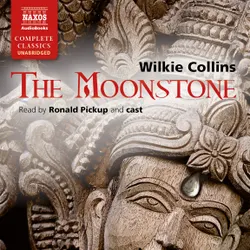
The Moonstone
Wilkie Collins
audiobookbook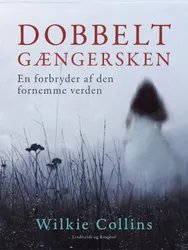
Dobbeltgængersken. En forbryder af den fornemme verden
Wilkie Collins
book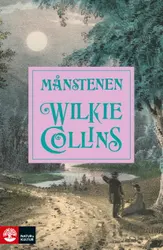
Månstenen
Wilkie Collins
book
Die Kasse von Herr Wray : Weihnachtskrimi
Wilkie Collins
book
No Thoroughfare :
Charles Dickens, Wilkie Collins
audiobook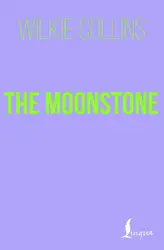
The Moonstone
Wilkie Collins
book
Antonina oder Der Untergang Roms: Historischer Roman
Wilkie Collins
book
Das Gesetz und die Dame: Kriminalroman
Wilkie Collins
book
Library of Masterpieces - 100 Books to Read in a Lifetime
illiam Shakespeare, Fyodor Dostoevsky, Louisa May Alcott, Miguel de Cervantes, John Milton, Jane Austen, Charlotte Brontë, Emily Brontë, Anne Brontë, William Makepeace Thackeray, George Eliot, Charles Dickens, Thomas Hardy, Jonathan Swift, Daniel Defoe, Joseph Conrad, Robert Louis Stevenson, Mary Shelley, Bram Stoker, Arthur Conan Doyle, Wilkie Collins, Oscar Wilde, T. S. Eliot, D. H. Lawrence, James Joyce, Virginia Woolf, E. M. Forster, Evelyn Waugh, Aldous Huxley, George Orwell, H. G. Wells, Lewis Carroll, Frances Hodgson Burnett, Kenneth Grahame, C. S. Lewis, Malcolm Lowry, Ford Madox Ford, Mark Twain, Jack London, Herman Melville, Ernest Hemingway, Jack Kerouac, Nathaniel Hawthorne, Edith Wharton, Walt Whitman, Kate Chopin, Harriet Beecher Stowe, Neale Hurston, Richard Wright, Raymond Chandler, Dashiell Hammett, F. Scott Fitzgerald, John Steinbeck, William Faulkner, Margaret Mitchell, Sylvia Plath, Carson McCullers, L. Frank Baum, L. M. Montgomery, Leo Tolstoy, Ivan Turgenev, Nikolai Gogol, Johann Wolfgang von Goethe, Friedrich Nietzsche, Thomas Mann, Franz Kafka, Erich Maria Remarque, Albert Camus, Marcel Proust, Jules Verne, Victor Hugo, Gustave Flaubert, Stendhal, Alexandre Dumas, Henrik Ibsen, Rudyard Kipling, Homer, Sophocles, Virgil, Laozi, Sun Tzu, Plato, Marcus Aurelius, Dante Alighieri, Niccolò Machiavelli
book
The Woman in White
Wilkie Collins
book
